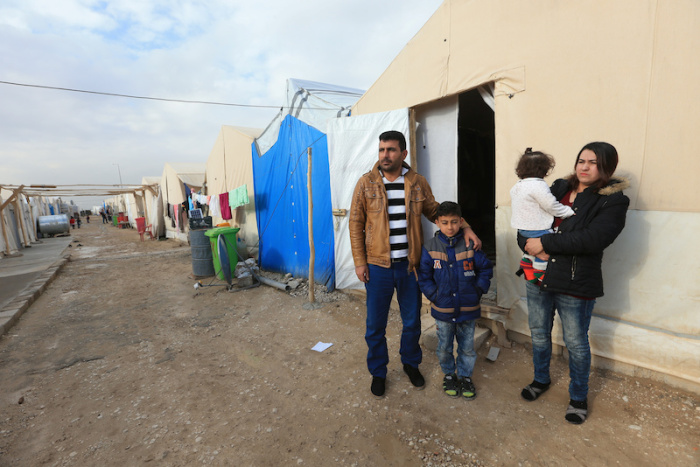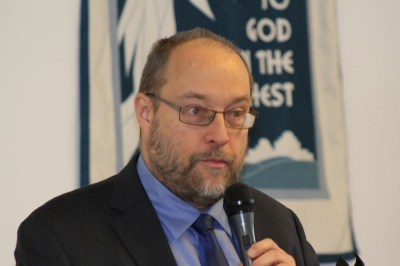Refugee Vetting Process Is Not Broken, Evangelical Resettlement Group Warns
The evangelical refugee resettlement organization World Relief, one of nine organizations authorized by the State Department to resettle refugees in the United States, is concerned that President Donald Trump's desire to change the refugee vetting process could "fundamentally alter" the U.S. refugee resettlement program.

Last Friday, Trump issued an executive order that suspended all refugee resettlement in the United States for a period of 120 days and indefinitely banned the resettlement of Syrian refugees until a review of the U.S. refugee resettlement screening process can be completed. Additionally, the order placed a 90-day ban on immigration from seven Muslim-majority countries.
Jenny Yang, the vice president of advocacy and policy for World Relief, warned about the dangers of Trump's executive order in a conference call with reporters on Tuesday. Yang argued that there is enough evidence over the last three decades since the Refugee Act was passed that suggests the U.S.' current refugee vetting system does enough to keep Americans safe.
"The reason I say [the order fundamentally alters the program] is during the 120-day ban, there is going to be changes to the vetting process, which is something that we have expressed concerns about because we believe the vetting currently has worked and has led to the success of the refugee resettlement program and refugees coming and being law-abiding and contributing members of society," Yang explained.

"Over the last couple of years, we have worked with the U.S. government to make sure that this program is as secure as possible. We know that refugees go through some of the most rigorous vetting of any immigrant to come in the United States," Yang added. "We believe that while the government has a role to play to ensure that our country remains safe, we don't believe that this 120-day suspension is merited considering the fact that the program has been successfully resettling refugees without significant national security risks for the past 35 years."
World Relief is the humanitarian arm of the National Association of Evangelicals. NAE Vice President of Government Relations, Galen Carey, also participated in the call and expressed his reservations about Trump's goal of improving the vetting process.
"It is quite possible that some possible extreme vetting measures that might be proposed could actually backfire," Carey said. "We have seen this in the past. For example, when the material support issue was added after 9/11, genuine refugees had been left out of our program because of a faulty interpretation of what it means to support terrorism and when people have actually been victims of terrorism. We certainly want our government to do due diligence but we want them to do it intelligently and to bear in mind that real lives are at stake."
The New York Times published an article that takes an in-depth look at the step-by-step process that refugees who are looking to be relocated to the U.S. must go through in order to officially be resettled. At a minimum, the screening process takes about 18 months. Refugees must also clear through a number of different federal databases.
"We also want to make sure that any [change] which happens to improve the resettlement process does so to actually improve how the process works instead of adding additional bureaucracy that would make the program less efficient," Yang stated, adding that World Relief has called on the Trump administration to shorten its 120-day resettlement suspension and lift the ban on Syrian refugees.
Matthew Soerens, World Relief's U.S. director of church mobilization, told The Christian Post on Monday that over 3 million refugees have been resettled in the U.S. since 1980 and none have killed American citizens.
"It's incredibly selective program to where if there are any doubts about someone's identity or their claims to refugee status or if there is a hint of concern that they might be a threat to public safety in the United States, they are excluded," Soerens explained.
Yang added that she is opposed to Trump's desire to prioritize religious minorities such as Christians.
"The executive order also provides a preference for religious minorities. It isn't clear what that exactly means. ... It is unclear as to how that is going to be applied in the future," she explained. "In certain cases, refugees and religious minorities have been intentionally designated and resettled. That hasn't been the fundamental reason for why refugees are selected for resettlement. It has always been based on vulnerability. I think that fundamentally changes the purpose of the resettlement program under the new executive order."
Although Yang, Soerens, Carey and evangelical leaders like National Hispanic Christian Leadership Conference's president, Rev. Samuel Rodriguez, have strongly opposed Trump's executive order, leading evangelist and head of the humanitarian aid organization Samaritan's Purse, Franklin Graham, has issued his support for Trump's executive order.
"I think that a thorough vetting process really needs to apply to people coming into the U.S. from all countries — not just 7. We have to be sure that the philosophies of those entering our country are compatible with our Constitution," Graham wrote on his Facebook page Tuesday morning. "If a person does not agree with our principles of freedom, democracy, and liberty, which we cherish, they should not be allowed to come. Without question, Sharia law is not compatible.
"Some are also criticizing Christians who support the president's position on immigration — and I'm one of those being criticized," Graham added. "But we have to realize that the president's job is not the same as the job of the church. As Christians we are clearly taught in the Bible to care for the poor and oppressed."




























